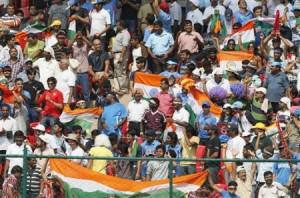Pride and Productivity: Weighing in on International Sporting Events
Weighing the Positives & Negatives of International Sporting Events
By Aditi Sethi, Staff Writer
“Major sports events lead to large drops in productivity. But, are the benefits from tourism, advertising revenue, surge in nationalism, and increase in investment worth the loss in work hours?”
 If you were to ask any Indian or Sri Lankan what they were doing on the morning of April 2nd, you would likely get the same answer: watching the ICC Cricket World Cup final. The Associated Chambers of Commerce and Industry of India (ASSOCHAM) estimated that 768 million man-hours (12 million multiplied by 8 hours, multiplied by 8 matches) would be lost to India’s biggest obsession.
If you were to ask any Indian or Sri Lankan what they were doing on the morning of April 2nd, you would likely get the same answer: watching the ICC Cricket World Cup final. The Associated Chambers of Commerce and Industry of India (ASSOCHAM) estimated that 768 million man-hours (12 million multiplied by 8 hours, multiplied by 8 matches) would be lost to India’s biggest obsession.
An average match lasts 8 hours, and a team battling its way to the final would play a total of eight matches. A nationwide survey was conducted before the Cricket World Cup to estimate how many people were planning to skip work in order to watch cricket matches. And, if anecdotal evidence is anything to go by, the results have been vindicated.
Major sports events lead to large drops in productivity. But, are the benefits from tourism, advertising revenue, surge in nationalism, and increase in investment worth the loss in work hours?
[pullquote]Major sports events lead to large drops in productivity. But, are the benefits from tourism, advertising revenue, surge in nationalism, and increase in investment worth the loss in work hours?[/pullquote]
The increase in consumption of alcohol from ticket sales certainly boosts GDP. Also, in the case of the Cricket World Cup, diplomatic relations between India and Pakistan allegedly improved thanks to “Cricket politics.” By hosting such an event, a country can show that it is a stable area for business, and thus attract investment. It is also a matter of pride: if the host country does well, the overall optimistic feeling could increase productivity as well as sales. Bangladesh, India, and Sri Lanka were the hosts of the 2011 Cricket World Cup.
During the FIFA Football World Cup in 2010, many employees were allowed to follow the matches at work. This seems to be the only way to make sure that people actually come to work, something that Indian employers should implement for the next Cricket World Cup. While the gains for the host country are enormous, other participating countries bear the loss in productivity without many of the benefits of increased investment and consumption. It is then not worthwhile for employers in these nations to sacrifice productivity for national pride.
But, regardless of whether benefits suffice or not, the reality is that sports fans will find ways to follow their games, whether that means coming to work and being productive, or not. The sooner we as a society acknowledge the ability of such sporting events to “freeze time”, the faster we can look at ways to make the most of the occasions.
ARB Team
Arbitrage Magazine
Business News with BITE.
Liked this post? Why not buy the ARB team a beer? Just click an ad or donate below (thank you!)
Liked this article? Hated it? Comment below and share your opinions with other ARB readers!





























Share the post "Pride and Productivity: Weighing in on International Sporting Events"